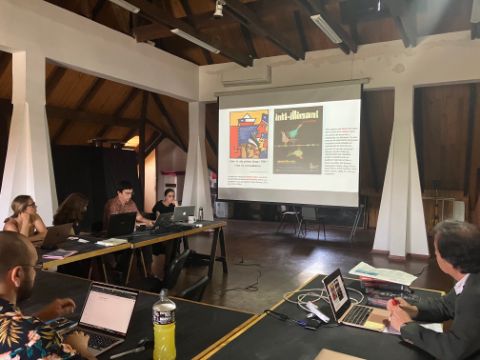Collaborative Practices: Mail Art, Murals, Posters, and Popular Graphics
Museo de la Solidaridad Salvador Allende – MSSA, Santiago Guillermo Deisler Archive at the Centro de Documentación de las Artes Visuales of the Centro Nacional de Arte Contemporáneo CEDOC/CNAC, Santiago Fundación Santos Chávez, Valparaiso, Chile, December 2023

Collaborative Practices: Mail Art, Murals, Posters, and Popular Graphics, Museo de la Solidaridad Salvador Allende – MSSA, Santiago, Chile, December 2023. Photo: Paz Guevara
After the military coup of 11 September 1973, several Chilean artists moved to the German Democratic Republic (GDR); they were among the nearly 2,000 political refugees who emigrated from Chile to the GDR, including cultural practitioners who engaged in collaborative and public formats such as posters, murals, mail and graphic arts. The workshop remembers these practices of collaboration and from an intergenerational perspective discusses the collaborative formats they fostered, and how they are relevant for us today.
Among the Chilean political refugees who came to the GDR was the muralist César Olhagaray (1951, lives in Santiago and Dresden), a member of the legendary Ramona Parra Brigade. Olhagaray arrived in Dresden in 1974, where he studied Visual Arts at the Dresden Academy of Arts. Since then, she has created more than 80 murals, including a mural in Maputo, Mozambique, as part of the cultural exchanges with ‘brother countries’ of the GDR. The Ramona Parra Brigade was founded in 1968 in Chile, whose practice of popular aesthetics in the streets of Chile was crucial in spreading the messages of the political campaign of socialist Salvador Allende, who eventually won the presidential elections in 1971. After the repression of the 1973 military coup, Olhagaray was detained in the National Stadium. The French government secured his release, and he moved to France and soon after to Dresden. Another example is that of Santos Chavez (1934–2001), a Mapuche artist who went into exile in the GDR in 1978, where he lived for 18 years. When he returned to Chile in 1994, he directed the graphic workshop of the Museo de la Solidaridad. His work is part of the MSSA collection. Guillermo Deisler (Santiago, 1940–Halle, 1995), after being arrested in Antofagasta prison in northern Chile, went into exile in the GDR. He arrived as the founder of the independent poetry and graphic publishing house Mimbre, which published more than 50 titles between 1963 and 1973 in Chile. It was in 1987, in Halle, Germany, that Deisler initiated the collaborative mail art project UNI/vers(;), together with Hans Braumüller, Theo Breuer, David Chikladze, César Figueiredo, Pedro-Juan Gutiérrez, Joseph Huber, Spencer Selby, K. Takeishi-Tateno and many others. UNI/vers(;) published for 35 issues. In 1990, Deisler produced wortBILD, an anthology of visual poetry produced in the GDR.
As a museum of modern and contemporary art, the mission of the Museo de la Solidaridad Salvador Allende is to activate, conserve and disseminate one of the most important collections of visual arts in Latin America, donated by artists from around the world in solidarity with the people of Chile, from the government of Salvador Allende until today, as well as its history and re-readings, through contemporary practices that energize the relationship with the public and society, according to our founding values: fraternity, art, and politics.
The Guillermo Deisler Archive gathers work and documentation related to the career of this Chilean artist, from his birth in Santiago de Chile in 1940 until today.